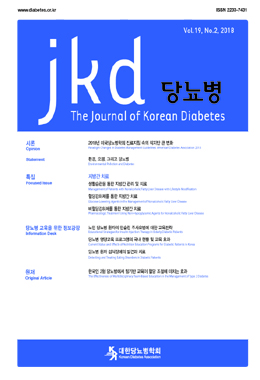Background: Although clinicians, nurse specialists, pharmacists, and nutritionists expend significant time and resources in optimizing care for patients with diabetes, the effectiveness of integrated diabetes care team approach remains unclear. We assessed the effects of a multidisciplinary team care educational intervention on glycated hemoglobin (HbA1c) levels among diabetes patients.
Methods: We conducted a matched case-control study in Korean patients with type 2 diabetes, comparing the propensity scores pertaining to the effectiveness in reducing HbA1c levels between a group receiving an educational intervention and a control group. We included 40 pairs of patients hospitalized between June 2014 and September 2016. HbA1c values measured at baseline, 3 months, and 6 months were compared between the two groups.
Results: The educated group showed an improvement in HbA1c levels compared to the control group at 3 months (6.3 ± 2.3% vs. 9.5 ± 4.0%; P = 0.020) and at 6 months (7.5 ± 1.5% vs. 9.6 ± 3.0%; P = 0.106). There was a significant difference in the change in mean HbA1c from baseline to 3 months between the two groups (-35.7 ± 26.1% vs. -9.1 ± 20.5%; P = 0.013).
Conclusion: A multidisciplinary team care education intervention was advantageous for improving glucose control in patients with type 2 diabetes, and may help to optimize glycemic control in clinical practice.


